Why Does ‘I Can Only Imagine’ Back Away from Redemption?
This article’s title is intended to draw you in, but I really mean it. Why did the recent Christian film I Can Only Imagine (a few details about the movie are below) pull short of showing redemption as fully as it could have done? Does that demonstrate something is wrong with Christian audiences? Is it a shortcoming of Christian stories in general–do we see it in speculative stories as well, like in the film version of The Voyage of the Dawn Treader?
By “back away from redemption” I mean something specific. An online dictionary (Mirriam-Webster) has three main definitions of redemption. The second is about property (so we can skip it for this conversation), but the first says, “the act of making something better or more acceptable.” While the third definition is, “Christianity: the act of saving people from sin and evil.”
Note the third definition requires sin and evil. Without evil, there isn’t any real redemption from evil.
I would say that I Can Only Imagine wound up trading “the act of saving people from sin and evil” for “the act of making something better or more acceptable.” Not entirely, but to a certain degree. In other words, to a certain degree, it traded Christian redemption for a more secular kind.
 This was not my first reaction to I Can Only Imagine, by the way. Though the movie has some of the corniness typical of Christian films, I was moved by the basic story of a son separated from his father and rebuilding that relationship with him, of a father turning to God, and a song partially inspired by that relationship. Though part of the reason that story resonated with me so strongly is my father drank. My father beat me severely only once, but he was recklessly dangerous for a child to be around apart from anything he did directly (I lost a finger as a child under his supposed supervision of wood cutting). He also was often absent while my parents were married and after their divorce, years would pass by without me hearing from him.
This was not my first reaction to I Can Only Imagine, by the way. Though the movie has some of the corniness typical of Christian films, I was moved by the basic story of a son separated from his father and rebuilding that relationship with him, of a father turning to God, and a song partially inspired by that relationship. Though part of the reason that story resonated with me so strongly is my father drank. My father beat me severely only once, but he was recklessly dangerous for a child to be around apart from anything he did directly (I lost a finger as a child under his supposed supervision of wood cutting). He also was often absent while my parents were married and after their divorce, years would pass by without me hearing from him.
I saw God through a variety of circumstances change my father’s life, so that he no longer is an alcoholic, no longer is absent and dangerous–who married another woman and has had another child and has been a good, responsible husband and father. These are changes I prayed for, for decades, and saw them happen. So, seeing Arthur, the father in I Can Only Imagine (played by Dennis Quaid) change also–well, at first it struck me in a powerful way.
I saw the movie a second time in Mexico with my wife’s parents (dubbed into Spanish). It was only as the church I attend decided to show the movie at a Sunday Evening service, me watching the movie for a third time, that I noticed something was wrong with the storytelling in relation to redemption.
Yes, I’m aware that I Can Only Imagine is based on true events, but even in telling a true story, the screen writer and director choose what material to include and what to omit. What they choose to include is what I’m talking about.
So the story records the subject of the story, Bart, telling people his father was monstrous. But what did the movie show in terms of his evil? It showed him burning a paper spaceship his son built. It showed some yelling (especially yelling, “you’re not good enough”), some glaring, and one swing of a plate onto Bart’s head.
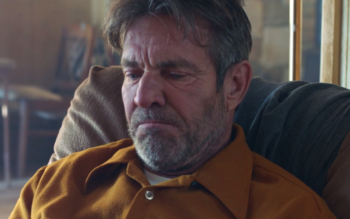
Arthur, unrepentant but regretful.
In a scene in which Bart says to his father (Arthur), “Do you remember the time you beat me so bad I had to lie on my stomach?” Arthur replies, “I cried all night when I did that.” Why did the story choose to have him say that? Even if the real father said those words at that moment (which may not have happened at all), I would have omitted it at that point in the story if I were the director, in order to heighten the contrast between who Arthur used to be and the redemption that came upon him after coming to Christ.
I probably would have also shown Arthur beating his son rather than having it referred to in the story.
Now I recognize that showing a father beating his son mercilessly would have possibly ruined the family-friendly status of I Can Only Imagine. Maybe it would have to have caused the movie to have been rated R, especially if they included the kind of language that Arthur probably actually used (which ironically perhaps, I would have been more reluctant to show than a beating). And the movie would have become traumatic to people sensitive to screen violence. So…I totally get why the filmmakers chose to steer away from that kind of controversy.
But why have Arthur say, “I cried all night”?
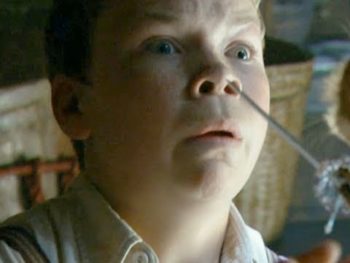
Eustace
I find a similar situation exists in The Voyage of the Dawn Treader movie (a movie with many problems beyond what I’m mentioning here, to be sure). In the book version of Dawn Treader, Eustace is an annoying pest. But he’s also evil–he’s a bully, eager to hurt and humiliate anyone he sees as weaker than himself. And he’s a self-centered egoist, willing to take rations from others and let them suffer in the belief he was more deserving than everyone else. It’s a judgment of the acting and character portrayal, but I would say the film version of Eustace only managed to be annoying. Not evil.
Perhaps that was an accident. Or perhaps the director softened Eustace deliberately, to make it easier for us to accept him as a regular person later on in the film.
Because that’s how human beings tend to be, isn’t it? We find it easier to accept a person changing for the better if we see there was good there all the time, don’t we? Redemption for a certain level of sin we are OK with, but if you show a stronger version of evil, we tend to balk. That is, at least some of my fellow human beings react that way–not all of us do. (I, myself, actually don’t think I belong to the “we” in the first two sentences of this paragraph.)
Could it be we have a hard time accepting the miracle of redemption?
Could it be that Christian audiences are like Bart in I Can Only Imagine, who distrusted his father’s sudden change? Could it be we are actually more tolerant of “the act of making something better or more acceptable” than we are of “the act of saving people from sin and evil”?
I don’t actually know. But maybe.
If I were to make a recommendation, it would be that if we’re going to tell stories of redemption, we should not back away from showing those to be redeemed as in sin first, showing them as actually being evil in an unflinching way before they hit their big change. Because backing away from showing evil makes the redemption weaker.
What are your thoughts?





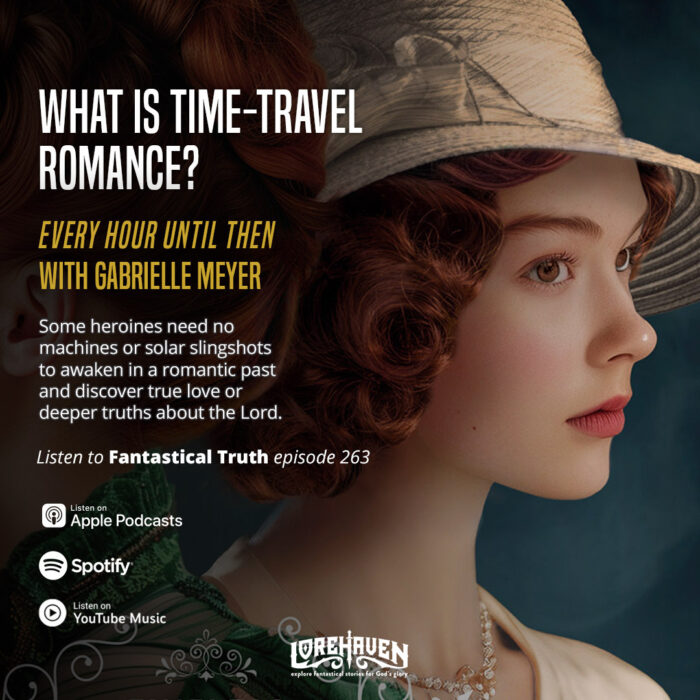















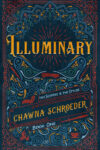








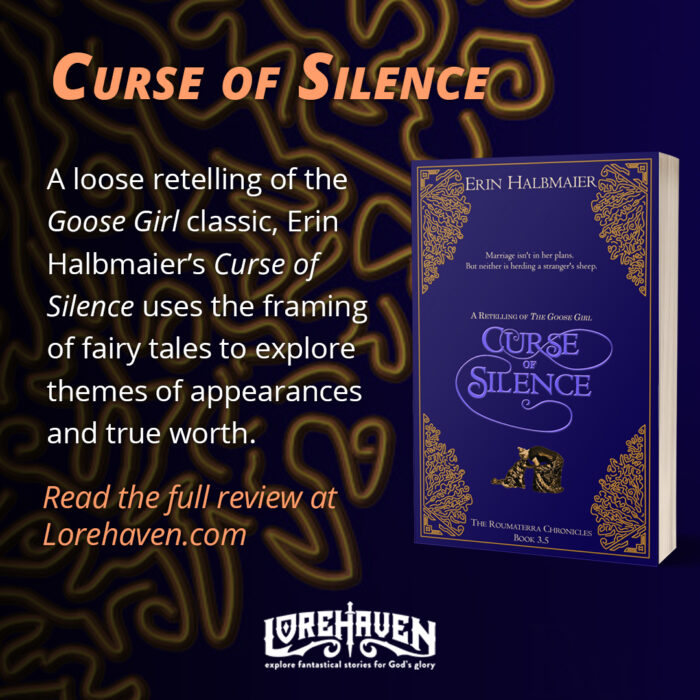


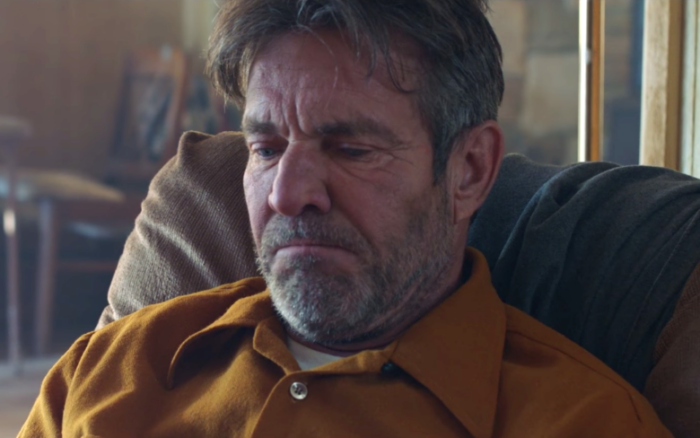




Good article. I agree that in order for light to truly shine you have to see the darkness first. There are ways the filmmakers could have done that with the beating without actually showing the beating. I haven’t seen the film, btw. But I also understand that they wanted the movie to appeal to a very wide audience so they’d be able to make future films. Don’t even get me started on The Voyage of the Dawn Treader… I disliked it more for how far it strayed from the book.
Yeah, The Voyage of the Dawn Treader was inexcusably bad in many ways…
As for wanting to appeal to a wide audience, yes, I know that’s what they were doing. I do think they made a mistake in how they told the story, but I totally get why they did it.
Or is evil more mundane than we figure?
I guess it’s human nature that we prefer the more dramatic stories rather than “I was kind of a jerk but then I came to Jesus.” It could be that they were emphasizing character over thematics, trying to make the dad seem like a more like a real person and less like a stereotype.
Evil IS more mundane in that there are more people beating the heck out of their kids than we like to imagine (and committing other kinds of extreme evil behind closed doors). Evil is also more mundane in that not all evil is so evident as someone who beats their kids–yes, sometimes, people are just jerks in anything but their own minds.
As for the dad seeming like a real person–I think that’s the crux of the problem I’m having. Do real abusers routinely cry all night after abusing someone? I would say, in general, no. My father did not cry at all that I know of the he quite literally kicked me again and again over 100 yards to the house (the one severe beating I referred to in the article) and he wasn’t even a routine abuser. My mother beat me and my sisters routinely until I was about ten, after which she stopped (and with terrible ferocity–my mom when she was young was bigger and stronger than most men) and she did in fact expressed regret many times before she quit, often immediately after beating us. But I don’t think she ever cried all night from, say, knocking me from one side of a room to the another so hard my feet left the ground and I bounced off the wall. Real abusers are not so sensitive, not usually.
Of course, this film is based on a real person and perhaps the real Arthur Millard really DID cry all night. Though he may or may not have mentioned it to his son at that particular moment. And even if he did mention it, the filmmakers did not have to include it–but they did.
So why did the filmmakers want to portray this particular abuser that way? I think (not sure, but I think) they thought people would have a hard time dealing with the actual level of evil that’s routinely possible in people. You seem to be implying the opposite–that since it’s a Christian stereotype that sinners are bad, if anything the dad was NOT a monster, just a jerk, and if anything the story is overemphasizing how bad he was. In this particular case, perhaps I’m right, perhaps you are, or perhaps neither of us are right.
But I can’t say I have seen much of Christian fiction portraying truly abusive people, of the type who would beat someone severely and not shed a tear, coming to Christ. No, I’ve only seen people kinda partially bad coming to Christ–the really bad ones stay lost. (Though Christian fiction actually tends to fall short of portraying ANYONE as evil in the way people often are.)
Maybe though I’m just not familiar with enough Christian fiction, because I don’t actually read a lot of it. Maybe it IS a Christian stereotype to have a story show a depth of true evil in a character and have that character find redemption. Feel free to give me some examples of that if you know them.
Eh, I don’t think it’s that far out of the woods to have an abuser feel SO SORRY (for themselves) that they just HAD to do a horrible thing (spoilers: they did not have to do that horrible thing).
Or the filmwriters don’t know how abusers work and pulled stuff out of their butts. (Which is the more likely, TBH.)
I’m quite sure some abusers feel sorry for themselves.
But just for the record, my mother felt remorse for what she did and said she was wrong to do it. Which she was. but then she’d do it again. Maybe in only 30 minutes. But she never gave us the “you made me do it” line. Though I know of people who do. It’s in fact probably more normal than my mom was…
I’m very glad you wrote this article. And I agree with your points – in general about the movie and about too much Christian fiction.
In my speculative fiction novel ”Mindfire” (Summer 2019), I purposefully did not avoid evil characters and people’s sins on the path to redemption. It may make some parts seem “dark” to some readers but it also makes it more real. And as the characters change for the better, my hope is that it’s more believable. Time will tell.
Thanks again for your insights. I appreciate them.
I only saw it once and while I cried and related as you did, I didn’t dwell on the story dynamics too awful much because I knew it would have ruined the experience for me. More than redemption, I think the story was about how the song came to be and Bart’s incredible ability to remain faithful in the storm around him. The line “I cried all night” stood out to me, too, as an obvious tool used to offer credibility to Quaid’s change. The dad’s story alone could have been a two hour movie, which makes your point even more interesting. It’s easy to skimp on the power of redemption for the sake of story, but If we only get one shot to speak to a dying world, which story should be told? Great post, btw.
Thanks for your positive comments. Yeah, it may be the “I cried all night” line was supposed to show a change, but the crying referred to was from BEFORE he changed. So that’s why it stuck me as a dissonant note. Though not right away.
I don’t know how true to life that line was, but it seems consistent with other things that Arthur was described as doing and saying in the movie. Threatening the (even more) abusive guy his ex wife ended up with, for instance.
I see your point, and I agree that there ought to be more stories where evil is redeemed in bold contrast, but I think using these two movies as example is kind of a poor choice. As you yourself said, straight on violence would have ruined the movie for families (and there are a lot of Christian families in need of good and safe movies) or triggered people with trauma. As for him saying “i cried all night” I think there is actually a point to helping the audience understand that even the worst humans can have regret and guilt…that they are not too far from the rest of us all. Seeing that in stories helps encourage us look for it in real life.
There are other stories of bolder contrast in redemption, and better yet, we can write them.
But frankly, good points in this article aside, this article irritates me. I’m tired of seeing Christians nitpick each other in an effort to look smarter. I’m tired of all the complaining. It was a well done faith-made movie (of which there are precious little). It didn’t even have to do with speculative fantasy.
I just wish there were more articles on this site encouraging and supporting authors and sticking to the actual subject genre, rather than waxing eloquent on what everyone else does wrong.
Hannah, I’m sorry to have irritated you. I can be really analytical but it’s totally not personal. I liked the movie, I thought it was a positive thing, and it was only (as I mentioned) after seeing it the third time that this particular issue stood out to me.
I don’t agree that supporting someone else implies always agreeing or avoiding any statement that could be seen as critical. In fact, I see your comment here as essentially positive and helpful–and you are essentially criticizing my thoughts in the same sort of way I did the movie.
As for “speculative fantasy” I did in fact think the same thing happened in the portrayal of Eustace in The Voyage of the Dawn Treader. Though I spent a lot less time talking about that, that’s true. But which you had to have seen–so I don’t know why you made the comment you did.
I’m also sorry if you dislike me “waxing eloquent.” I was only trying to write the best article I could based on something that was on my mind. I was just trying to make a meaningful article that will catch people’s attention–I was not consciously trying to be eloquent or falsely “wax eloquent.”
I think offering criticism is a legitimate thing to do. It does not have to imply tearing anything down.
Good article, and I agree.
I know that it won’t resonate with everyone, but the the concept of the darker the night, the brighter the light is the whole point.
Yet as an author, I have had non-believers leave reviews on my books saying that the character’s change of heart was too unrealistic. Hey, you can’t win ’em all. 😉
I think real redemption can be quite surprising. People actually expect folks to gradually get better–which is in fact how things are much of the time with people. But sometimes repentance brings shocking and immediate changes. I thought that’s what I Can Only Imagine was saying happened with Arthur Millard–but then they failed to fully show those changes.
The line about Arthur crying all night isn’t necessarily humanizing and pity inducing in every case, regardless of how the film makers meant it. To me it was humanizing, but I know other people would have seen it as Arthur making excuses or trying to make himself look better. Personally, I found it to be a very important piece of characterization for him. That’s how people talk in arguments sometimes, and regardless, it hints at why he was abusive(anger issues, alcoholism, or something of that sort). An abuser with those traits is way different than someone that is abusive due to a personality disorder like narcissism or antisocial personality disorder.
That said, there are definitely a lot of cases where showing the character’s previous depravity is extremely important for truly expressing their redemption later on. One of my chars in particular comes to mind when I think of this. I will hold back in some parts of her story because it would be too graphic otherwise, but those things are still heavily implied. And even if some parts of her story aren’t shown directly, there’s plenty of other things she does that would make the audience see her as a very horrible person at the beginning.
With her story, there’s actually something really interesting I’ve learned. When writing a character, it’s possible to humanize them with actions that show they care about others, but later on show how even those behaviors are very unhealthy. This character I’m talking about, for instance, is an angel descendant, so at times in her youth she is seen as being kind to a particular human sometimes, but a few centuries later she reflects and realizes that she almost treated him like a child or a pet sometimes and feels yet another wave of guilt over who she used to be.
As for Voyage of the Dawntreader, yeah, they did a bad job with that movie. Part of it may have been that they didn’t understand how important Eustace’s redemption was for the story, or they felt that audiences would prefer a story driven by ‘action and plot’ rather than a character arc.
I see this sometimes with Christian reviews of films… it’s like “villain does bad things” under objectionable content and I’m just …like… it’s in the word.